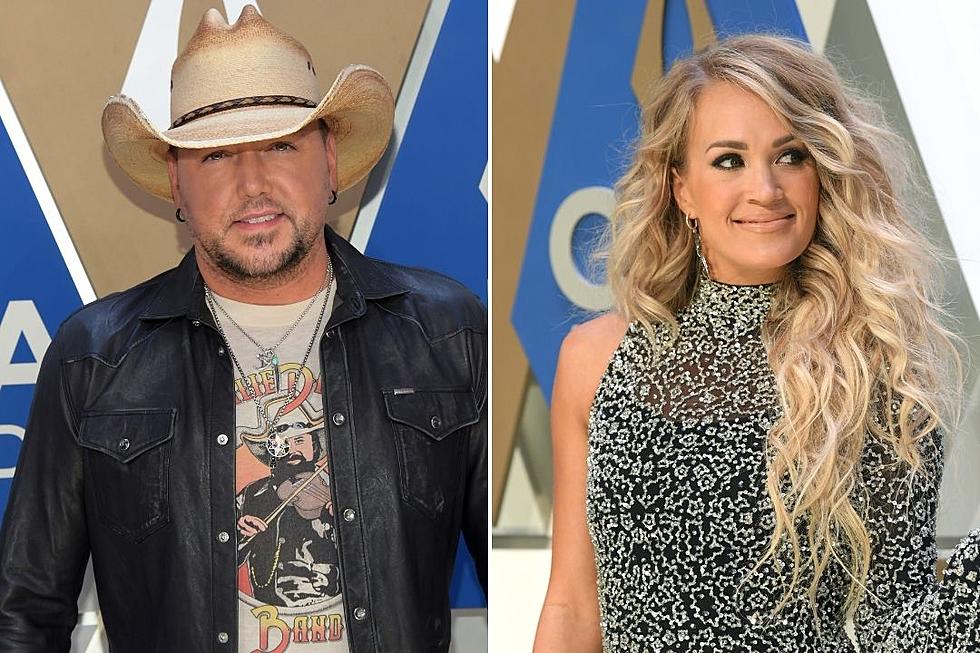
What’s Behind the ’80s Rock Revival in Country Music?
Country curmudgeons looking to blame hip-hop for what they see as the fall of country music have it wrong. Sure, acts like Brantley Gilbert and Jason Aldean are quick to drop rappers alongside country legends when listing influences, but it’s the aggressive, unapologetically loud guitar riffs of the ‘80s that are truly shaping the format today.
Trace Adkins explained why when telling Taste of Country about his ‘Love Will …’ album last spring. The hot producers of today grew up on Def Leppard, Poison and Van Halen, he said, in addition to that era’s country groups like Alabama and Exile. What’s old has become new again, and there are examples of it all over your radio.
Listen to ‘Done’ by the Band Perry. The fiddle solo that come two minutes in is tweaked to sound like a keytar, something that would have been totally rad in 1987. Credit 53-year-old Dann Huff for that, the trio says. Adkins’ album was produced in part by Tony Brown, whose impressionable wild years would have been around the late '70s and early '80s. The singer says he also co-produced his album -- his ‘80s influences are well known.
The subgenre known as Bro-Country also borrows from themes the great ‘80s hair metal bands relied on. Lyrical depth wasn’t why people listened to Warrant and Motley Crue. Their best songs dripped with testosterone and excess, much like hits from Florida Georgia Line do today. Credit producer Joey Moi. It’s not clear who influenced the 37-year-old, but his resume prior to FGL suggests a love of thick guitar riffs and meaty rock music. Comparisons between the Moi-produced Nickelback and the music coming from Tyler Hubbard and Brian Kelley are easy to make.
Parmalee’s Matt Thomas tells Taste of Country the ‘80s were a major influence on his band. “I remember Bon Jovi when I was a kid growing up,” the ‘Carolina’ singer says. “Seeing him fly over the stage. The 'Livin' on a Prayer' video was probably the coolest thing ever.”
So, why don’t these bands and producers stick to their rock roots? Thomas says his band came to a crossroads and decided to try Nashville after years struggling to break through as a rock band on a national level. “I think it's just the evolution of the music to be honest with you,” he explains. “We have so many people that were influenced by so much. People are on playlists now, they're not on records. It used to be you'd buy yourself one record. Now I think everybody's got playlists of everything.”
He hints at a more tangible reason: The rock format is struggling to feed itself. Radio stations are flipping to other formats, while album sales are dropping faster than newspaper sales. Country music is slumping as well, but not nearly as much as rock.
“I think the rock format is so specific,” Thomas says, suggesting what the problem is. “You have active rock, alternative … there's so many different genres that split up the rock -- classic rock, new rock -- I think that probably hurt the whole format.”
“You listen to country radio you have country-rock, you have classic country, but they'll play all of it on a station," he furthers.
The Cadillac Three are another country band that probably would have steered toward rock radio if it were 1994 instead of 2014. In fact, this trio derived from an alt-rock and then southern rock band before finding country success with ‘The South,’ a song that is about as loud as anything you’ll find on country radio.
There’s a limit to how far the rock invasion can go, however. Eric Church released ‘The Outsiders’ after the 2013 CMA Awards and watched as the song was met with a tepid response from all but his most loyal fans. He may have been premature in declaring all genres dead, but once-unique styles are certainly slipping into a big melting pot called country music. That creates confusion and heated debates between traditionalists and progressives, but it may be what's allowing the format to thrive.
What are your thoughts? Tell us in the comments section.
More From 106.5 WYRK




![Lily Rose Plays Coy With an Ex in ‘I Don’t Smoke’ [Listen]](http://townsquare.media/site/204/files/2021/09/attachment-lily-rose-new-song-i-dont-smoke.jpg?w=980&q=75)

![Onoleigh’s New Single ‘Make It Hurt’ Hits Close to Home for the Rising Country Artist [Exclusive Premiere]](http://townsquare.media/site/204/files/2021/08/attachment-onoleightoc.jpg?w=980&q=75)



